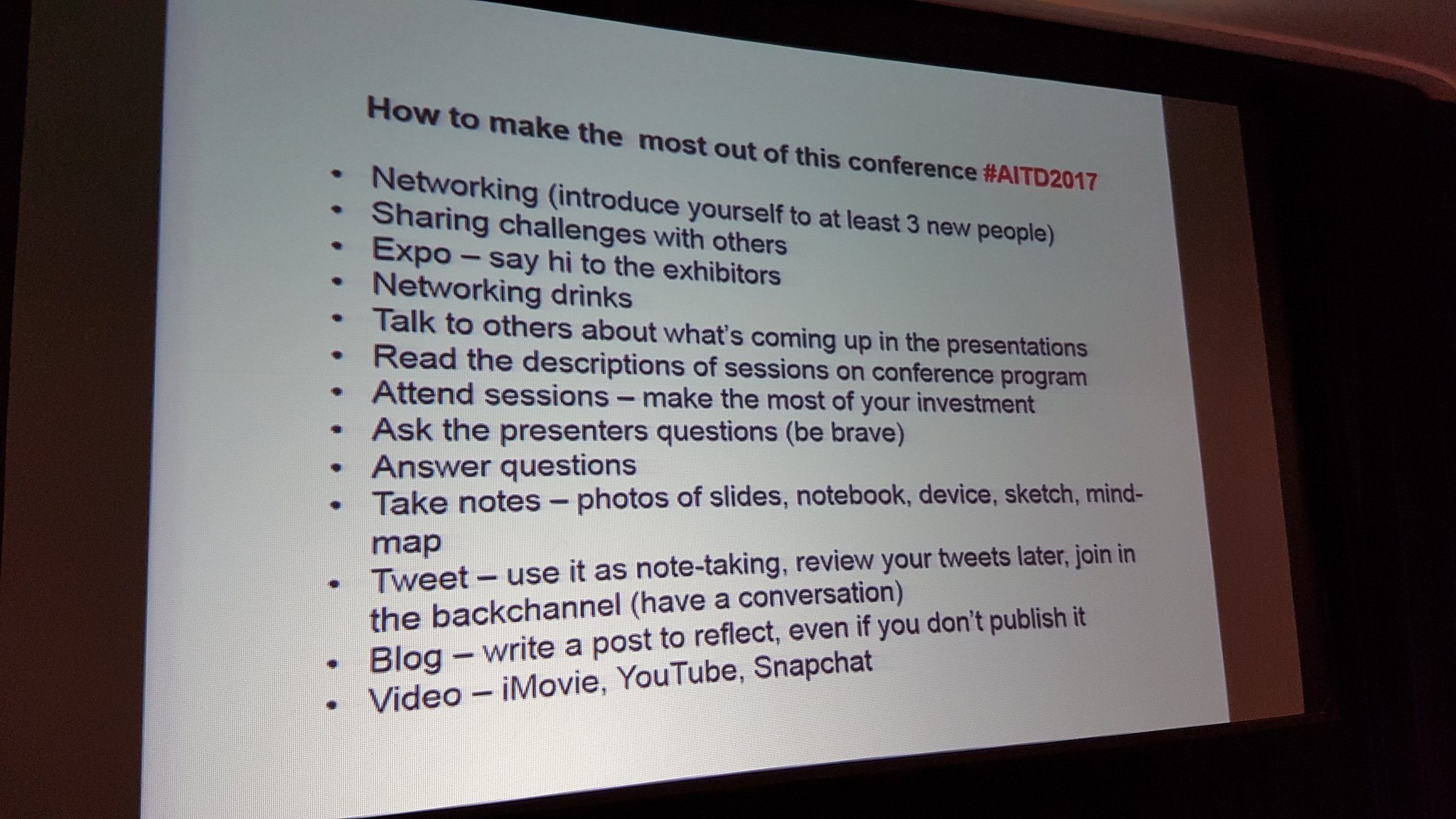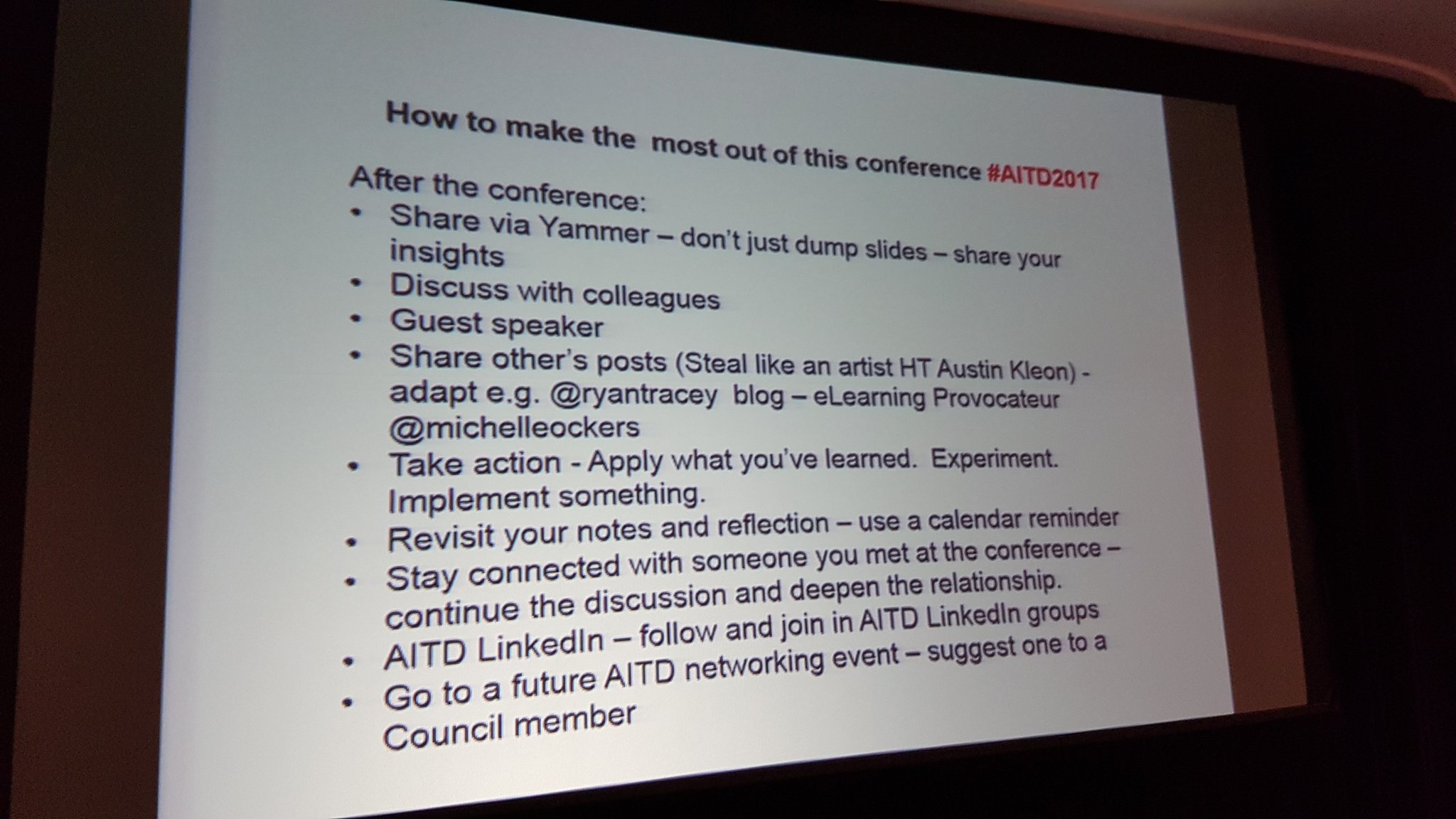When I was invited to kick off last week’s AITD National Conference by hosting a breakfast session about Personal Knowledge Management, the last thing I wanted to do was deliver a traditional presentation.
Given the massive scope of PKM, I needed to narrow my focus. And given the contemporary thrust of this event, I needed to do something fresh.
After agonising over the problem for almost a full minute, it dawned on me that the immediate relevance of PKM to the conference attendees lay in how they were going to make the most out of said conference.
But who was I to teach my peers in the industry how to suck eggs? So I ditched the typical instructivist approach in favour of the andragogic. In other words, I crowdsourced the content.
From this fruitful exercise I’m pleased to share with you 8 co‑created tips for making the most out of a conference.
1. Attend all the sessions.
This one seems too obvious to mention, but a 1 or 2 day conference can be mentally exhausting. You may be tempted to wag a session here or there to relax and recharge, but don’t do it out of sheer laziness.
I’ve lost count of the number of times an apparently unattractive session has turned out to be excellent, or it’s sparked a useful tangential idea.
Remember you’ve invested time and money into these days. They won’t be back until next year, so extract every drop of goodness while you can.
2. Read the blurbs.
Conference organisers are getting a lot better at ensuring the content of the blurb bears some resemblance to the content of the session.
Read the blurb to get your mindset in order, and to consider how the content will help you in your role. Also consider what questions you might want to have answered. Which leads me to…
3. Ask questions.
Some presenters welcome questions during the session, while others prefer you wait until the end. In either case, be brave and ask your questions because by doing so you are personalising your learning experience.
4. Take notes.
The fire hydrant of ideas is too much for the human brain to handle, so you need to distribute your cognition.
You might want to go old-school by jotting your notes down on paper, or type them into a mobile device. Alternatively you could take photos, draw pictures, produce mind maps, or record videos.
I like to tweet my notes because the character limit forces me to zero in on the essence of the message. After the conference, I’ll look up my profile on Twitter to review my list.
5. Use social media.
If you do use Twitter, include the official hashtag in your tweets. Not only does this feed the backchannel, but you too can follow the tweets of your fellow attendees. I find it fascinating to learn their thoughts about the session I’m watching.
If you don’t blog, I suggest you reconsider. Even if you don’t publish your work, blogging is an excellent vehicle for reflection. After the conference, expand on the notes you’ve taken by deep diving into aspects that take your fancy. And if you publish your blog, you’ll be sharing something useful with the wider community.
6. Extend your network.
In the AITD’s discussion forum on LinkedIn, I asked my fellow members whether conferences were obsolete in the digital age. Each of the 20-odd replies I received was a resounding “no”, citing the rich networking opportunities that in-person events offer.
I love catching up with old friends as well as meeting new people at conferences. I used to be too shy to introduce myself to strangers, until I realised I was doing my professional development a disservice.
I also consider it a professional courtesy to speak to the vendor reps at the expo. They financially support the running of the conference, so the least we can do is say hello. I know from first-hand experience how awful it feels to be ignored by attendees. So class up and have a chat. Besides, you might find something helpful.
7. Share your wisdom.
There’s no point hiding your notes in a drawer or keeping them locked inside your head. Share your new-found knowledge with your colleagues, adding your own insights for local context.
In fact, if your employer paid for your ticket, I’d argue you have an ethical obligation to do this.
8. Transform your business.
Don’t stop now!
Review your notes with the intent of converting each one into action. What can you do to make it happen? Even if it’s something tiny, do it to get the ball rolling.
The overarching theme of these tips is: BE ACTIVE!
When you attend your next conference, you’ll get out of it what you put into it.



This is a great summary of your session Ryan and a great example of you practicing what you’re preaching! I loved Arun Pradhan’s comment of “If you’re only going to take one thing away from this presentation then seriously … take more notes”. I’ve been thinking about this since conference and have added a concept introduced to me by Dr. Will Thalheimer of situational action triggers (http://www.willatworklearning.com/2014/09/triggered-action-planning.html?undefined.mjjo). So … take more notes, and create some situational action triggers.
Cheers Neil. I laughed out loud at Arun’s comment, though not everyone seemed to get the joke ;)
Good stuff. I’m looking forward to your early bird session being shared online as it was full!
Arun’s comment was hilarious. I made more notes!
Cheers David :)
Cool tips, Thanks Ryan.
Cheers Vivi :)
Hi Ryan,
Just want to say thanks again for this insightful piece on making the most out of a conference. Last week I attended the Early Childhood Australia Conference with several of my colleagues, many of whom had never been to such a learning event. Before we went to the conference I shared your post with them. I encouraged my team to heed your advice and challenged them to make the most out of the opportunity. I look forward to seeing what my team bring back and how they transform our business. Thanks!
Elizabeth
That’s great, Elizabeth. I hope my tips helped make it a more effective learning experience for them. Thanks for sharing!
Thank you Ryan this is great tips
Thank you Shibin :)